2019-2020学年高二英语人教版选修七教案:Unit4 Sharing-Period 3 Learning about language
高二英语人教课标选修7Unit4Sharing教案.doc1
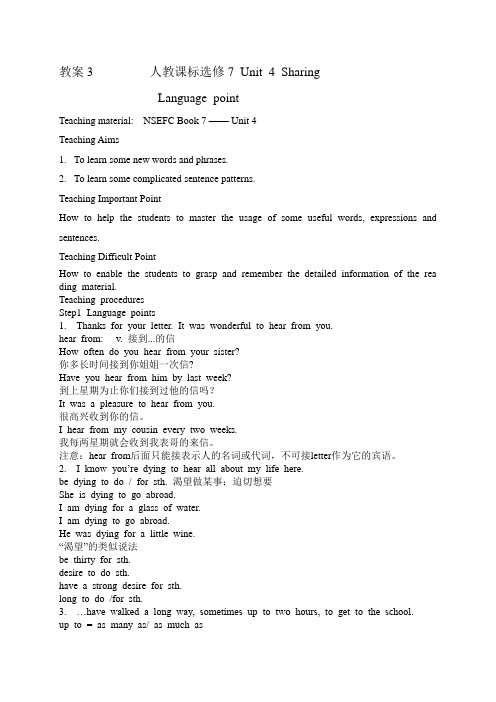
教案3 人教课标选修7 Unit 4 SharingLanguage pointTeaching material: NSEFC Book 7 —— Unit 4Teaching Aims1.To learn some new words and phrases.2.To learn some complicated sentence patterns.Teaching Important PointHow to help the students to master the usage of some useful words, expressions and sentences.Teaching Difficult PointHow to enable the students to grasp and remember the detailed information of the rea ding material.Teaching proceduresStep1 Language points1. Thanks for your letter. It was wonderful to hear from you.hear from: v. 接到...的信How often do you hear from your sister?你多长时间接到你姐姐一次信?Have you hear from him by last week?到上星期为止你们接到过他的信吗?It was a pleasure to hear from you.很高兴收到你的信。
I hear from my cousin every two weeks.我每两星期就会收到我表哥的来信。
注意:hear from后面只能接表示人的名词或代词,不可接letter作为它的宾语。
2. I know you’re dying to hear all about my life here.be dying to do / for sth. 渴望做某事;迫切想要She is dying to go abroad.I am dying for a glass of water.I am dying to go abroad.He was dying for a little wine.“渴望”的类似说法be thirty for sth.desire to do sth.have a strong desire for sth.long to do /for sth.3. …have walked a long way, sometimes up to two hours, to get to the school.up to = as many as/ as much asHe can earn up to $50,000 a year.up to 还可以表示1)be up to sth = be busy doing sth. 忙于2)It is up to sb to do sth 由某人负责做某事3)一直She lived at home right up to / until she got married.What are these naughty boys up to?It is up to me to do this task.I am not sure if she is really up to that job.4. I’m still trying to adapt to these conditions but, one thing is …adapt (oneself) to 适应,适合The new students are very slow to adapt to the rules.新生对于那些规定适应得很慢。
【范文】人教版高中英语选修7教案Unit 4 Sharing
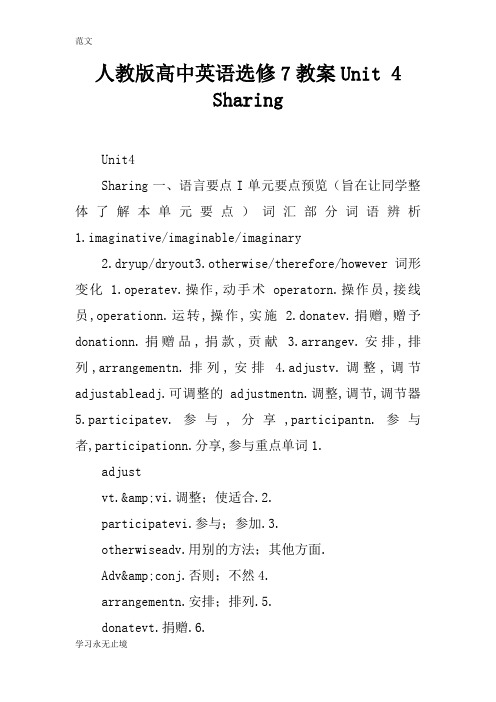
人教版高中英语选修7教案Unit 4SharingUnit4Sharing一、语言要点I单元要点预览(旨在让同学整体了解本单元要点)词汇部分词语辨析1.imaginative/imaginable/imaginary2.dryup/dryout3.otherwise/therefore/however词形变化 1.operatev.操作,动手术operatorn.操作员,接线员,operationn.运转,操作,实施 2.donatev.捐赠,赠予donationn.捐赠品,捐款,贡献 3.arrangev.安排,排列,arrangementn.排列,安排4.adjustv.调整,调节adjustableadj.可调整的adjustmentn.调整,调节,调节器5.participatev.参与,分享,participantn.参与者,participationn.分享,参与重点单词1.adjustvt.&vi.调整;使适合.2.participatevi.参与;参加.3.otherwiseadv.用别的方法;其他方面.Adv&conj.否则;不然4.arrangementn.安排;排列.5.donatevt.捐赠.6.purchasevt.&n.买;购买.7.distributionn.分配;分发;分布状态.8.relevantadj.有关的,相应的9.operatev.操作,运转,开动,起作用重点词组dyingto.极想;渴望.theotherday几天前stickout.伸出inneed.在困难中;在危急中.重点句型1.whenIreachtheschoolgroundstherearelotsof “goodmorning”formefromtheboys.2.youaskedwhetherI’mgettingtoknowanylocalpeople.3.Thegiftcoversthecost ofexercisebooksandtextbooksforcommunityprimaryschoo lsthatoperateinpoororremotevillages.重点语法限制性定语从句II词语辨析1).imaginative/imaginable/imaginaryadj.【解释】imaginative富有想象力的,创新的imaginable可想象得到的imaginary想象中的,虚构的【练习】选择imaginative/imaginable或imaginary并用其适当的形式填空1)Althoughthemaincharactersinthenovelaresotruetolif e,theyare_______.2)It’s_______forsuchan_______writertocreate_______storie s.3)Thisistheonlysolution_________.4)Thefamouspoemwasfroman______poet.keys:1)imaginary2)imaginable;ima ginative;imaginary3)imaginable4)imaginative2).dryup /dryout【解释】dryup使完全变干;(河流,湖泊等)干涸dryout变干,干透【练习】选择dryup或dryout,并用其适当的形式填空1)Thefarmerspumpedwatertotheirfieldstostopthesoil__ ______.2)Thepool________inthelateautumn.3)Thevillag ershadtowaitforthesunto_________thedirtroad.4)Don’tleavethevegetableonthetable,oritwill________.keys: 1)dryingout2)driesup3)dryup4)dryout3)otherwise/ther efore/however【解释】otherwise否则;不然thereforeadv.因此,所以however无论如何,可是【练习】选择otherwise/therefore或however并用其适当的形式填空1)Hedidn'tworkhardatEnglish_______hewouldn'tfinditd ifficulttolearnnow.2)wedonothaveenoughmoney._____ ____wecannotaffordtobuythenewcar.3)Thefirstpartwas easy;thesecond,________,tookhours.4)Heisnoisy,but________aniceboy.5)weweregoingtoplayfootball,butitwassohotthatwedecidedtodo_____________.keys:1 )otherwise2)Therefore3)however4)otherwise5)otherwiseIII词性变化(旨在提供语法填空所需材料)1.operatev.操作,动手术operatorn.操作员,接线员,operationn.运转,操作,实施2.donatev.捐赠,赠予donationn.捐赠品,捐款,贡献 3.arrangev.安排,排列,arrangementn.排列,安排 4.adjustv.调整,调节adjustableadj.可调整的adjustmentn.调整,调节,调节器5.participatev.参与,分享,participantn.参与者,participationn.分享,参与【练习】根据句子结构,用括号内所提供词的适当形式填空1)Theyencouragedthe_______to_______inthesingingperf ormanceafterthecontest..2)Thedoctorare________onan______ofafactorywhogotinjuredwhen_______amachine,and the________issaidtolastovertenhours.3)Theseatsinthe planeare________,andyoucan________themtoacertainang le.The______isnotdifficulttomake.4)Thedrinkswere________tothembycocacolacompanyandtheyreceived_______f romothercompaniesaswell.5)ourdepartmentwillbeinchar geof_______theconference.wouldyoupleasegiveussomesu ggestionsonthe_______forit?keys:1)participants;part icipate2)operating;operator;operating;operation3)ad justable;adjust;adjustment4)donated;donation5)arran ging;arrangementIV重点词汇(旨在提供综合运用所需材料)1.adjustvt.&vi.调整;使适合.[重点用法]adjustmentn.调整;修正adjustableadj.可调节的;可调整的adjust使适应;适应。
2019-2020年高中英语 Unit 4 Sharing 写教案 新人教版选修7

2019-2020年高中英语 Unit 4 Sharing 写教案新人教版选修7Teaching goals 教学目标1. Ability goals能力目标Enable the students to write about a person’s experience by using time expressions. Enable the students to write a letter to a child they would like to sponsor.2. Learning ability goals学能目标Help the students learn how to write about a person’s experience by using time expressions. Help the students learn how to write a letter to a child they would like to sponsor. Teaching important and difficult points教学重难点The characteristics of narration.Teaching methods教学方法Task-based method and writing.Teaching procedures & ways教学过程与方式Step I RevisionCheck the homework.Ask some students to read the sentences with attributive clauses in “A LETTER FROM PLAN”.1. My name is Rosanna and I work as a munity volunteer in an area of Ecuador where Orlando and his family have lived for as long as they can remember.2. Although they still have time to play, they also have to help with daily jobs, which can take up a lot of time.3. Orlan do’s family lives in a small metal house that has a straw roof and a dirt floor.Step Ⅱ Pre-writingT: Let’s recall something about Dr Mary Murray, who worked as a volunteer with Medecins Sans Frontieres (MSF). Who’d like to say something about her? Let’s try it this way. Each of you is given the chance to say only one sentence about Dr Mary Murray. OK, begin.Of course, you can have an attributive clause in your sentence.Step Ⅲ WritingT: Very good. Now you are asked to write about Dr Murray for the school magazine. Write a paragraph on each topic below in the order shown. Remember to use time expressions listed on Page 36.1. who she is2. reasons why she joined MSF3. what she did in Malawi4. what she did in the Sudan5. the effects on her of her experiences6. her plans for the futureAfter the students have finished writing, show two samples on the screen and check the mistakes if any.Step Ⅳ Writing taskDeal with WRITING TASK on Page 75.T: Imagine that you have decided to sponsor Shan-shan, a 11-year-old girl from Gansu Province. Her family cannot afford to keep her at school. But she loves practicing English. Write a letter to her in English. In your letter, you can:Introduce yourselfSay something about your interests and hobbiesDescribe your familyLet her know you want to make friend with her and hear from herOther things you would like to tell herAfter the students have finished writing, ask several of them to read their letters.。
人教版高二英语选修7Unit4Sharing全单元教案
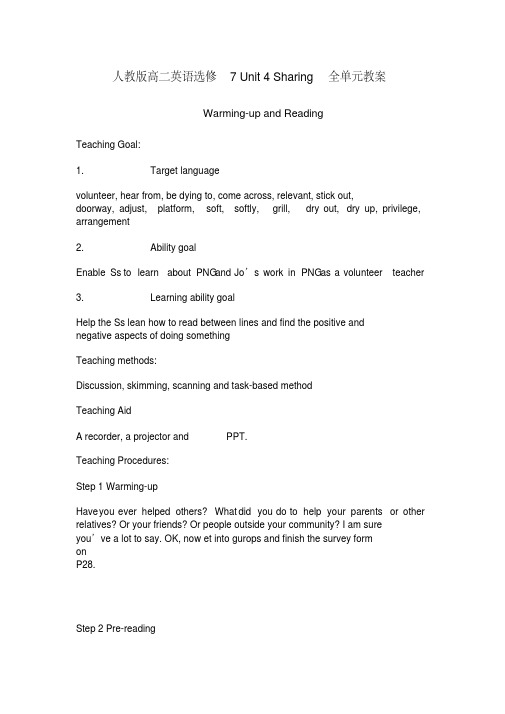
人教版高二英语选修7 Unit 4 Sharing 全单元教案Warming-up and ReadingTeaching Goal:1. Target languagevolunteer, hear from, be dying to, come across, relevant, stick out,doorway, adjust, platform, soft, softly, grill, dry out, dry up, privilege, arrangement2. Ability goalEnable Ss to learn about PNG and Jo’s work in PNG as a volunteer teacher3. Learning ability goalHelp the Ss lean how to read between lines and find the positive andnegative aspects of doing somethingTeaching methods:Discussion, skimming, scanning and task-based methodTeaching AidA recorder, a projector and PPT.Teaching Procedures:Step 1 Warming-upHave you ever helped others? What did you do to help your parents or other relatives? Or your friends? Or people outside your community? I am sureyou’ve a lot to say. OK, now et into gurops and finish the survey formonP28.Step 2 Pre-readingAsk Ss to find out PNG on the map and disucuss the photos in the reading passage.Step3 Reading1. ScanningScanning the text and fill the blanks with their names.1._____ is a young Australian woman.2.________ was dying to hear all about Jo’s life in PNG.3._______ walked a long way to get to school.4.___________ didn’t have any textbook.5._____ became a lot more imaginative when teaching.6._____ started jumping out the windows during achemistry experiment.7.________ v isited a village that was the home o f one the boys, Tombe.8._____ started crying “ieee ieee” to welcome them.9._____ led us to a low bamboo hut.10._____ was going to share the platform with Jenny and Jo.11.________ softly talked to each other in their language Jodidn’t understand2. Skimming the text and find the general idea of each paragraph.3.detailed reading Task-based (ex1 in comprehending part.Type of houseFamily relation-shipsCooking methodsSleeping arrange-mentsType of houseFamily relation-shipsCooking methodsSleeping arrange-mentsStep IV.HomeworkSuppose you've graduated from a key university and now y ou are a volunteer who works in the remote region to assit the basic education there. Andyou are to write a letter home to introduce your present situation. (youcan refer to the text).Extensive ReadingTeaching goals:1. Enable the Ss to know the purpose of a website called“world gifts” and give their opinions on it.2. Enable the Ss to learn about the international welfare programmer called “Plan International” and a child who has been sponsored through it.Teaching important and difficult points:Get the Ss to realize that they should make the most of what they own and do something for the poor.Teaching method:Task-based method and fast readingTeaching aids:A recorder, a projector, a compute connected to the Internet.Teaching procedures:Step I.RevisionDictation eight sentences, each contain the vocabulary they ‘ve learned in this unit.Step II. Pre-reading“Have you ever tried to send a gift to the children in poorareas or countries? Probably not. Today, we can have access to a website, where you can send your gifts to those who are in great need. Please glance quickly at the Internet page on Page 33, and answer the followingquestions.1. What does the page show you?2. Where is the list of gifts?3. In what kind of order are the gifts listed? How much arecheapest and dearest gift?4. where is the gift card?5. What do the photos show you?Step III. Careful ReadingReading carefully.And the task is to finish Ex2 on page 34.Discussing What do you think of this website and its idea? Do you thinkpeople will get interested in it and buy its gifts? Do you think thosegifts listed are really helpful? Now turn to page 34. Discuss the topicsin Ex 3 in groups. Choose one of the topics to discuss.Step IV. Reading TaskDeal with reading task in the work book.We have talked about the Chinese welfare programmer Project Hope whichhelps children in poor areas go back to school. In the world, there aremany organizations or programmers that help different groups of peoplein one way or another. Today, we will get to know another organizationcalled Plan International. Turn to page 73,. This is a letter from Rosannato some students. Rosanna works as a volunteer of Plan International inan area of Ecuador. Why did she write to the Ss? What did the Ss do? Read the letter and find the answers. While reading, summarize the topic ofeach paragraph and finish Ex on page74.Step V. Homework1. Ask Ss to search for information about Plan International.2. Pick out the sentences with attributive clauses in “ A letter from Plan”.WritingTeaching Goal:Enable the Ss to write about a person’s experience by using time expression_r_rEnable the Ss to write a letter to a child they would like to sponsorTeaching important and difficult pointsThe characteristics of narrationTeaching methods:Task-based methodTeaching AidA projector and PPT.Teaching Procedures:Step 1 RevisionCheck the homeworkAsk some S s to read sentences w ith attributive clauses in “ A letter from plan”.Step 2 Pre-writingLet’s recall something about Dr Mary Murray, who worked as a volunteerwith Medicines Sans Frontiers (MSF). Who’d like to say something about her? Let’s try it this way. Each of you is gi ven the chance to say only one sentence about Dr Mary Murray. OK, begin. Of course, you can have an attributive clause in your sentenceDr Mary Murray was a volunteer, who worked with Medicines Sans Frontiers (MSF).Dr Mary Murray once worked in clinic in both Malawi and Sudan which are developing countries in AfricaStep 3 WritingVery good. Now you are asked to write about Dr Murray for the school magazine. Write a paragraph on each topic below in the order shown.Remember to use time expression_r_rs listed on Page 35.Points must be included:1. who she is2. reasons why she joined MSF3. what she did in Malawi4. what she did in the Sudan5. the effects on her of her experiences.6. her plans for the futureStep 4 Writing taskDeal with writing task on Page75.Imagine that you have decided to sponsor Shanshan, a 11-year-old girl from Gansu province. Her family cannot afford to keep her at school. But sheloves practicing English. Write a letter to her in English. In your letter, you can:Introduce yourselfSay something about your interests and hobbiesDescribed your familyLet her know you want to make friend with her and her from herOther things you would like to tell her.After the Ss have finished writing, ask several of them to read theirletters.Sample writing:Dear Shanshan,I’m a student of Guangzhou No.1 senior High School, Guangdong p rovince. My English name is Steve, and I like English very much. Maybe I can helpyou to continue with your school.I go to school everyday except on Sundays. Every morning, we have four lessons, including P.E., arts, music. I like sports very much, especially football .Whenever I’m free I would play football with my classmates.I also enjoy reading English papers, which gives me great delight, andhelps improve my studies.I have a small family. There are father, mother and I. Mum often cooksdelicious food for me. And Dad u sually encourages me t o study hard in order to serve the country and people better. I think so. So I work very hardat my lessons.I’m looking forward to hearing from you. I want to know what you needbadly so that I know what I can do fro you .Don’t hesitate to ask for what you want. I will try to help youYourssincerelySteveStep 5 AssignmentAsk Ss to polish the letter they wrote in class and hand it in tomorrow.。
2019-2020年高中英语 Unit 4 Sharing语法课教案 新人教版选修7
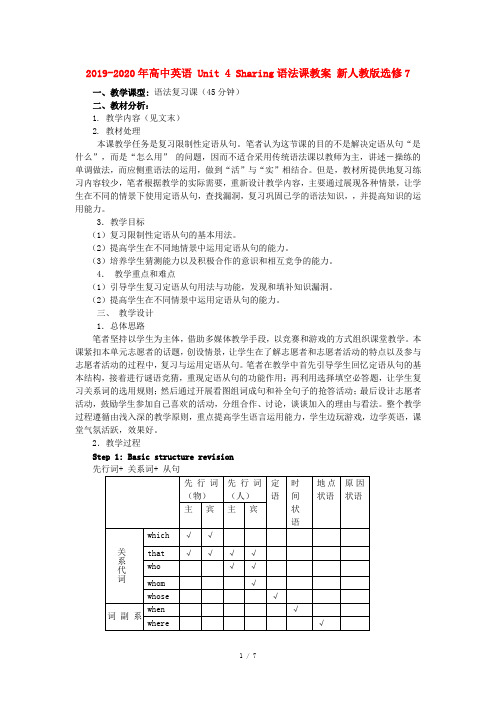
2019-2020年高中英语 Unit 4 Sharing语法课教案新人教版选修7一、教学课型:语法复习课(45分钟)二、教材分析:1. 教学内容(见文末)2. 教材处理本课教学任务是复习限制性定语从句。
笔者认为这节课的目的不是解决定语从句“是什么”,而是“怎么用”的问题,因而不适合采用传统语法课以教师为主,讲述-操练的单调做法,而应侧重语法的运用,做到“活”与“实”相结合。
但是,教材所提供地复习练习内容较少,笔者根据教学的实际需要,重新设计教学内容,主要通过展现各种情景,让学生在不同的情景下使用定语从句,查找漏洞,复习巩固已学的语法知识,,并提高知识的运用能力。
3.教学目标(1)复习限制性定语从句的基本用法。
(2)提高学生在不同地情景中运用定语从句的能力。
(3)培养学生猜测能力以及积极合作的意识和相互竞争的能力。
4.教学重点和难点(1)引导学生复习定语从句用法与功能,发现和填补知识漏洞。
(2)提高学生在不同情景中运用定语从句的能力。
三、教学设计1.总体思路笔者坚持以学生为主体,借助多媒体教学手段,以竞赛和游戏的方式组织课堂教学。
本课紧扣本单元志愿者的话题,创设情景,让学生在了解志愿者和志愿者活动的特点以及参与志愿者活动的过程中,复习与运用定语从句。
笔者在教学中首先引导学生回忆定语从句的基本结构,接着进行谜语竞猜,重现定语从句的功能作用;再利用选择填空必答题,让学生复习关系词的选用规则;然后通过开展看图组词成句和补全句子的抢答活动;最后设计志愿者活动,鼓励学生参加自己喜欢的活动,分组合作、讨论,谈谈加入的理由与看法。
整个教学过程遵循由浅入深的教学原则,重点提高学生语言运用能力,学生边玩游戏,边学英语,课堂气氛活跃,效果好。
2.教学过程Step 1: Basic structure revisionwhy √[此环节以公式和表格形式测试学生对定语从句基本结构的熟悉情况,简单明了,有利于快速激活学生已有的知识。
人教版高二英语选修七Unit4 Sharing教案设计
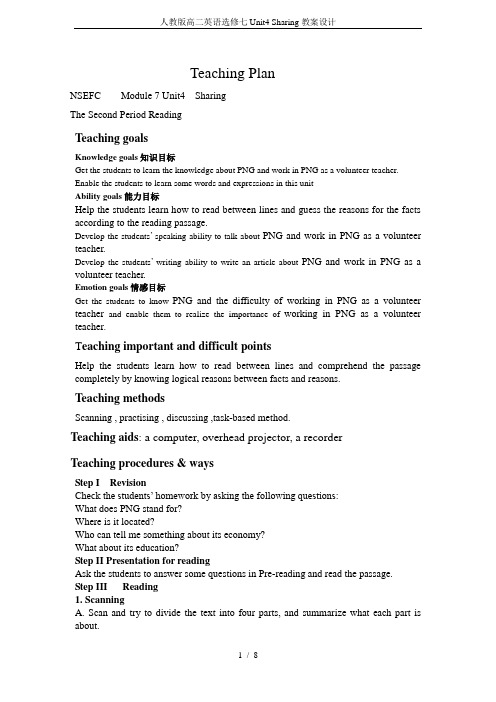
Teaching PlanNSEFC Module 7 Unit4 SharingThe Second Period ReadingTeaching goalsKnowledge goals知识目标Get the students to learn the knowledge about PNG and work in PNG as a volunteer teacher. Enable the students to learn some words and expressions in this unitAbility goals能力目标Help the students learn how to read between lines and guess the reasons for the facts according to the reading passage.Develop the students’ speaking ability to talk about PNG and work in PNG as a volunteer teacher.Develop the students’writing ability to write an article about PNG and work in PNG as a volunteer teacher.Emotion goals情感目标Get the students to know PNG and the difficulty of working in PNG as a volunteer teacher and enable them to realize the importance of working in PNG as a volunteer teacher.T eaching important and difficult pointsHelp the students learn how to read between lines and comprehend the passage completely by knowing logical reasons between facts and reasons.Teaching methodsScanning , practising , discussing ,task-based method.Teaching aids: a computer, overhead projector, a recorderTeaching procedures & waysStep I RevisionCheck the students’ homework by asking the following questions:What does PNG stand for?Where is it located?Who can tell me something about its economy?What about its education?Step II Presentation for readingAsk the students to answer some questions in Pre-reading and read the passage.Step III Reading1. ScanningA. Scan and try to divide the text into four parts, and summarize what each part is about.B. help the students to master the basic forms of a letter writing.2.Careful readingRead paragraphs 2-7 and then do the exercise.Step IV PracticeA.Find words in the passage that have the following meaning.B.Learn the following words or phrases by heart and complete the paragraph.stick out, come across, hear from, platform,(be) dying toStep V Post-readingDeveloping : I. guessingGuess the reasons for the facts according to the reading passage.Developing : II. discussionAsk the students to discuss the following question in group:Why do you think Jo became a volunteer in PNG?(Give as many possible reasons as you can.)Give the students a sample of the discussions :A: I think, first of all, Jo was a kind-hearted woman, who is willing to help others. Second, she knew enough about the poor conditions in PNG and thought that she could help teach in the schools. If I am given the chance, I will do whatever I can to help.B: In my opinion, Jo must have worked as a teacher in Australia, and she applied to become a volunteer abroad, and then she was sent to PNG as a volunteer.C: Maybe she thinks that education is the key to solving all the problems in PNG, so she, as a teacher, goes to PNG to help.Homework1. Finish Exercise 3 on Page 31.2. Read the passage again after class and find all the attributive clauses in it.3.Recite the key sentences in the text.教学流程图:Recite the following phrases and sentences after class:1.stick out 伸出e across 偶然发现或遇到;碰见3.hear from 接到……的信4.(be) dying to 极想;渴望5.in need 在困难中6.adapt (oneself) to 适应,适合7.for sure肯定如此,毫无疑问8.make a difference有关系;起(重要)作用9.dry up(河流,湖泊)干涸;(使)枯竭10.dry out(使)变干;(把)弄干11.adjust to 适应12.in the night在夜间1). I know you’re dying to hear all about my life here.2). I’ve included some photos which will help you picture the places I talk about.3). Tombe’s father, mukap, led us to his house, a low bamboo hut grasssticking out of the roof----this shows it’s a man’s house.4). When I reach the school grounds there are lots of “good mornings”for me from the boys, many of whom have walked a long way, sometimes up to two hours, to get to the school.5). In fact , I wonder if you could post this letter for me.。
人教版高中英语选修7教案Unit Four Sharing
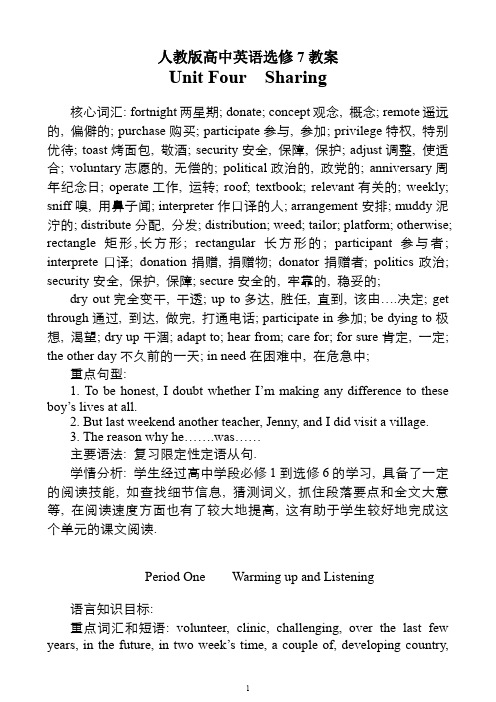
人教版高中英语选修7教案Unit Four Sharing核心词汇: fortnight两星期; donate; concept观念, 概念; remote遥远的, 偏僻的; purchase购买; participate参与, 参加; privilege特权, 特别优待; toast烤面包, 敬酒; security安全, 保障, 保护; adjust调整, 使适合; voluntary志愿的, 无偿的; political政治的, 政党的; anniversary周年纪念日; operate工作, 运转; roof; textbook; relevant有关的; weekly; sniff嗅, 用鼻子闻; interpreter作口译的人; arrangement安排; muddy泥泞的; distribute分配, 分发; distribution; weed; tailor; platform; otherwise; rectangle矩形,长方形; rectangular长方形的; participant参与者; interprete口译; donation捐赠, 捐赠物; donator捐赠者; politics政治; security安全, 保护, 保障; secure安全的, 牢靠的, 稳妥的;dry out完全变干, 干透; up to多达, 胜任, 直到, 该由….决定; get through通过, 到达, 做完, 打通电话; participate in参加; be dying to极想, 渴望; dry up干涸; adapt to; hear from; care for; for sure肯定, 一定; the other day不久前的一天; in need在困难中, 在危急中;重点句型:1. To be honest, I doubt whether I’m making any difference to these boy’s lives at all.2. But last weekend another teacher, Jenny, and I did visit a village.3. The reason why he…….was……主要语法: 复习限定性定语从句.学情分析: 学生经过高中学段必修1到选修6的学习, 具备了一定的阅读技能, 如查找细节信息, 猜测词义, 抓住段落要点和全文大意等, 在阅读速度方面也有了较大地提高, 这有助于学生较好地完成这个单元的课文阅读.Period One Warming up and Listening 语言知识目标:重点词汇和短语: volunteer, clinic, challenging, over the last few years, in the future, in two week’s time, a couple of, developing country,Medicines Sans Frontiers (MSF), Malawi, Sudan, The Fred Hollows Foundation, The Cancer Council, Youth in the City, go blind, belief Why did Mary decide to work in a developing country?In the Sudan, why was it nearly impossible for Mary to get to the clinics when the rains came?Why were conditions in the clinics in the Sudan challenging?语言技能目标: 通过听一段采访, 了解默里夫妇作为一个志愿者为Medicines Sans Frontiers工作的经历, 提高学生听前预测, 注意细节信息等听力方面的技能.情感态度和文化意识目标: 借助听力材料, 让学生自己思考是否会像莫里夫妇那样做志愿服务工作. 把学生的实际和所听到的内容结合起来, 培养学生正确的价值观.教学重点: 1) 学会边听边注意听力材料中的细节信息, 并作笔记.2) 在讲述个人生平时, 常采用时间表达法. 学会关注对话中的时间表达法以及出现的先后次序.教学难点: 1) 根据列表掌握听力材料中的细节信息. 2)学习采用时间表达法来表述一个人的生平.Step 1 Lead-inLead in the new text by asking some questions:1. Some questions1) Have you ever helped others?2) What did you do to help your parents, your friends or your relatives?2. Make a class list of the different things our classmates do for each of the groups on the survey form.3. Discuss whether someone who helps the groups on the survey form can be called a “volunteer”?Step 2 Pre-leadingTurn to Page 35, read Exercise 1 and 2 in Listening and speaking, predict what you will hear in the listening material.Step 3 Listening2. Listen to it again and answer some questions.1) Why did Mary decide to work in a developing country?________________________________________________________.2) When Mary worked in a clinic in Malawi, why did the children die?_______________________________________________________.3) In the Sudan, why it nearly impossible for Mary to get to the clinics when the rains came?________________________________________________________.4) Why were conditions in the clinic in the Sudan challenging?________________________________________________________.5) Why does Mary enjoy her job?________________________________________________________.Step 4 Listening on Page 70Listen to the materials on Page 70 and then finish the exercises in the workbook.Step 5 Homework1. Finish off the exercises.2. Look for more information about MSF on Internet and share it with your partners.Period Two Pre-reading and Reading语言知识目标:1. 正确理解和运用下列单词: airmail; fortnight; roof; muddy; textbook; concept; weekly; relevant; remote; weed; rectangle; rectangular; adjust; platform; broom; tin; jar; sniff; participate; interpreter; grill; otherwise; privilege.2. 重点词组: hear from, be dying to; the other day; dry out; dry up语言技能目标:强化略读, 查读等阅读技能, 训练通过寻找关键词, 主题句等方式更快速地准确确定文章的段落大意, 理清文章的总体框架与脉络; 运用已经掌握的基本猜词技巧猜测文章中的部分单词.语言能力目标: 增强阅读理解能力; 发展借助图片, 表格等非语言信息进行语言输出的能力.重难点:1. 获取巴布亚新几内亚独立国各部落生活状况和风俗习惯的信息; 阅读能力的培养和阅读技巧的训练, 如精读课文完成表格填空.2. 理解作为志愿者工作的意义, 从而树立正确的价值观; 训练用英语获取信息, 处理信息, 分析问题和解决问题的能力.Step 1 Warming up1. Show the sign of United Nations V olunteer in China.从整体上看,标志是一颗爱心的造型,同时还是英文“青年”首写字母“Y”的样貌。
人教版高中英语选修7《Unit4Sharing》教案
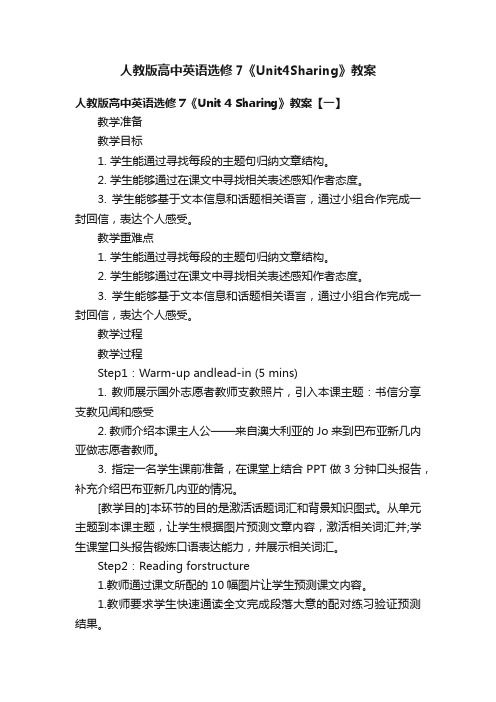
人教版高中英语选修7《Unit4Sharing》教案人教版高中英语选修7《Unit 4 Sharing》教案【一】教学准备教学目标1. 学生能通过寻找每段的主题句归纳文章结构。
2. 学生能够通过在课文中寻找相关表述感知作者态度。
3. 学生能够基于文本信息和话题相关语言,通过小组合作完成一封回信,表达个人感受。
教学重难点1. 学生能通过寻找每段的主题句归纳文章结构。
2. 学生能够通过在课文中寻找相关表述感知作者态度。
3. 学生能够基于文本信息和话题相关语言,通过小组合作完成一封回信,表达个人感受。
教学过程教学过程Step1:Warm-up andlead-in (5 mins)1. 教师展示国外志愿者教师支教照片,引入本课主题:书信分享支教见闻和感受2. 教师介绍本课主人公——来自澳大利亚的Jo来到巴布亚新几内亚做志愿者教师。
3. 指定一名学生课前准备,在课堂上结合PPT做3分钟口头报告,补充介绍巴布亚新几内亚的情况。
[教学目的]本环节的目的是激活话题词汇和背景知识图式。
从单元主题到本课主题,让学生根据图片预测文章内容,激活相关词汇并;学生课堂口头报告锻炼口语表达能力,并展示相关词汇。
Step2:Reading forstructure1.教师通过课文所配的10幅图片让学生预测课文内容。
1.教师要求学生快速通读全文完成段落大意的配对练习验证预测结果。
2.教师引导学生归纳出全文的整体结构。
[教学目的] 本环节的目的是让学生了解文章的整体结构。
不仅让学生学会寻找中心句,而且让学生从每个段落的中心句归纳出课文整体结构,让学生回顾信息交流类书信的写作结构。
Step3:Reading fordetails (10 minutes)1.教师要求学生先同桌配对合作,然后按照学习小组分组合作,仔细阅读文章细节找出信息,完成下列表格(划线部分是学生需要填出的部分):2.教师引导学生根据文章中的相关语言和信息体会作者的感情和态度。
- 1、下载文档前请自行甄别文档内容的完整性,平台不提供额外的编辑、内容补充、找答案等附加服务。
- 2、"仅部分预览"的文档,不可在线预览部分如存在完整性等问题,可反馈申请退款(可完整预览的文档不适用该条件!)。
- 3、如文档侵犯您的权益,请联系客服反馈,我们会尽快为您处理(人工客服工作时间:9:00-18:30)。
Unit 1 Living Well
Period 3 Learning about language 教案
I.Teaching aims:
1. Guess words according to the word meaning.
2. Fill in the blanks of a given passage.
3. Learn important words , phrases and some important sentence stuctures.
II.Procedures
Step 1 Do exercise for Ex.1 on page32
Find words in the unit that have the following meanings.
1.___to change slightly to make something work better (adjust)
2 ____ a metal shelf for cooking meat, toasting bread, etc (grill)
3 ____ connected with what is being done or discussed (relevant)
4 ____ an idea(concept)
5 ____ an honour(privilege)
6 _____something that has been organized(arrangement )
7. ____written work in an office, such as writingreports or letters(paperwork)
8. ____ to breathe air into your nose noisily(sniff)
Step2 Complete the paragraph with words or phrases below in their proper form. Sharon looked at herself in the mirror and sighed. She had posted the airmail letter to Tim last week but had had no reply.She smoothed her hair down with a wet comb, wiped her muddy shoes, and thought about the three months she had known her. He was the nicest boy she had ever met.Otherwise she would not have fallen in love
with him. She still remembered that he adjusted quickly when he heard she came from a remote village. At first she had heard from him every week but now she had not heard for a fortnight. Why? She had decided to find out. She walked down the platform to catch the train to New York feeling both excited. and nervous. She was dying to see him again but what if he didn't want to see her?
Step3 Look at these definitions and make suitable phrasal verbs with the words in the right box. Then make a dialogue using each one.
out; off; up; from; for; up; down; of; to
1( dry out) to become complete dry.
2(dry up) to become dry on the surface.
3(dry off) to come to an end
4(hear out) to listen to somebody till the end
5(hear from) to receive a letter or a phone call from someone
6(hear of )to have knowledge of sb/ sth
7(be dying to ) to want to do something very much
8(die out ) to disappear or stop existing completely
9(die down ) to graduallyy get quieter
Step4 Summary
Learn important words , phrases and some important sentence stuctures.。
